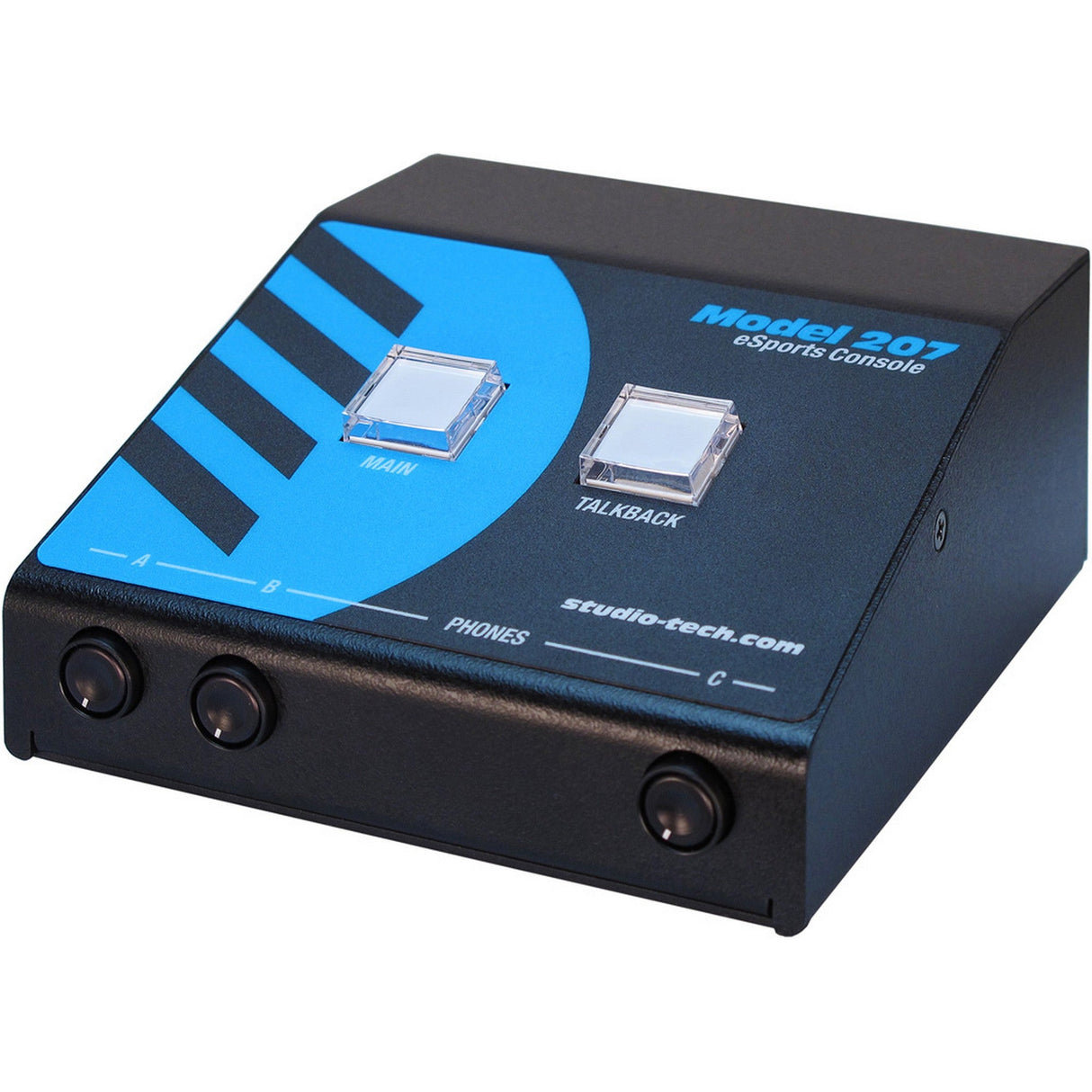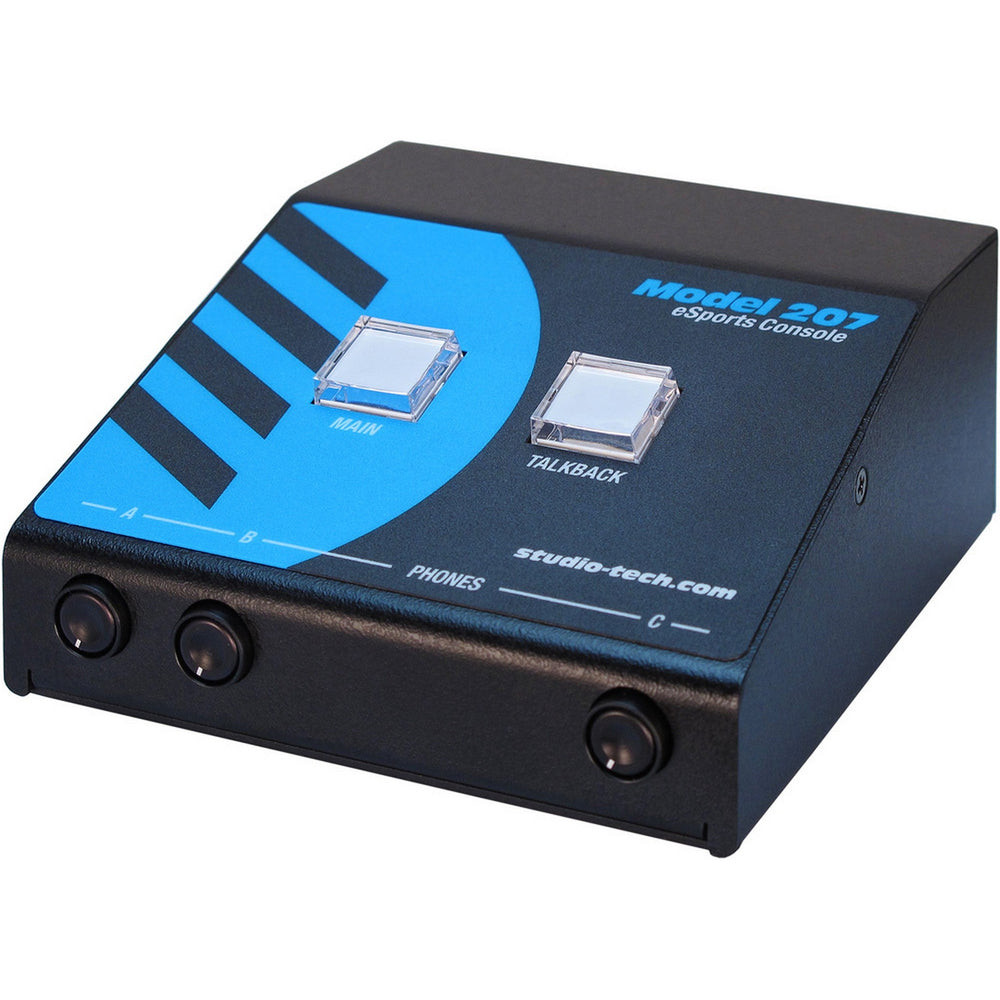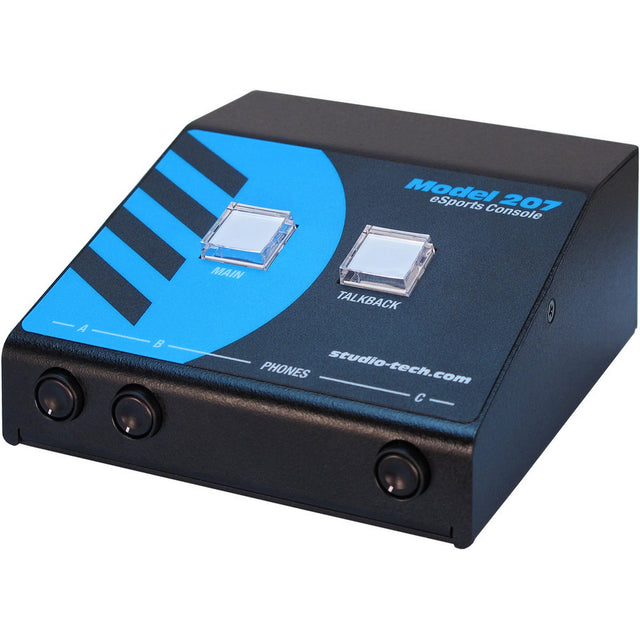Free Shipping
Pickup later: Pickup available after order processing
More finance options:
Estimated Shipping Widget will be displayed here!
Condition: New
Description
Studio Technologies Model 207 eSports DANTE Console
The Studio-Tech Model 207 integrates directly into both Dante audio-over-Ethernet and standard analog audio environments. With just a Power-over-Ethernet (PoE) connection, a broadcast or “gaming” headset, and a connection to a stereo line-level audio source, a complete player position can be created.
Model 207 operating features are configured using the STcontroller software application. An extensive set of parameters allows the unit's functions to be tailored to meet the needs of many applications. STcontroller, compatible with version 7 and later of the Windows operating system, is a fast and simple means of confirming and revising the unit's operating parameters.
The Model 207 on its own can provide an “all-Dante” solution for one game player location. The unit's small size makes it ideal for live applications where physical space for personnel is very limited. Four Dante receiver (audio input) channels supply the user with their talent cue (IFB) signals. Should the cue signal be “mix-minus” an integrated sidetone function can provide the user with a microphone confidence signal. Two Dante audio output channels are associated with a connected headset's microphone, one designated as main and the other as talkback. Two additional Dante outputs have signal sources derived from the Model 207's stereo line input. These two audio channels, typically provided by a personal computer, can also be routed to the headphone output.
Ethernet Data and PoE
The Model 207 connects to a local area network (LAN) by way of a standard 100 Mb/s twisted-pair Ethernet interface. The physical 100BASE-TX interconnection is made by way of a Neutrikr etherCON RJ45 connector. While compatible with standard RJ45 plugs, etherCON allows a ruggedized and locking interconnection for harsh or high-reliability environments.
The Model 207's operating power is provided by way of the Ethernet interface using the 802.3af Power-over-Ethernet (PoE) standard. This allows fast and efficient interconnection with the associated data network. To support PoE power management, the Model 207's PoE interface enumerates (reports) to the power sourcing equipment (PSE) that it's a class 2 (low power) device. If a PoE-enabled Ethernet port can't be provided by the associated Ethernet switch a low-cost PoE midspan power injector can be utilized.
Dante Audio-over-Ethernet
Audio data is sent to and received from the Model 207 using the Dante audio-over-Ethernet media networking technology. As a Dante-compliant device, the Model 207's two Dante transmitter (audio output) channels and four Dante receiver (audio input) channels can be assigned (routed or “subscribed”) to other devices using the Dante Controller software application. The Dante transmitter and receiver channels are limited to supporting four Dante flows, two in each direction. The digital audio's bit depth is up to 24 with a sampling rate of 44.1 or 48 kHz. Two bi-color LEDs provide an indication of the Dante connection status. An additional LED displays the status of the associated Ethernet connection.
Audio Quality
The Model 207's audio performance is completely “pro.” A low-noise, wide dynamic-range microphone preamplifier and associated voltage-controlled-amplifier (VCA) dynamics controller (compressor) ensures the headset's microphone audio quality is preserved while minimizing the chance of signal overload. The output of the microphone preamp and compressor is routed to an analog-to-digital conversion (ADC) section that supports sampling rates of 44.1 and 48 kHz with a bit depth of up to 24. The audio signal, now in the digital domain, routes through a 32-bit microprocessor and on to the Dante interface section where it is packetized and prepared for transport over Ethernet.
Key Features
- Dante audio-over-Ethernet technology
- Supports headsets with 5-pin XLR and 3.5 mm TRRS connectors
- Unbalanced stereo line-input for compatibility with computer audio
- One main and one talkback output channel
- Highly flexible 2-channel headphone output
- Compact unit supports one on-air location
- Excellent audio performance
- Uses STcontroller for configuration
- Power-over-Ethernet (PoE) powered
Technical Specifications
Power Source
Power-over-Ethernet (PoE)
class 2 (low power, =6.49 watts)
Network Audio Technology
Type
Dante audio-over-Ethernet
AES67-2013 Support
yes
Dante Domain Manager (DDM) Support
Yes
Bit Depth
up to 24
Sample Rate
44.1 and 48 kHz
Number of Transmitter (Output) Channels
4 (Main, Talkback, Line In L, Line In R)
Number of Receiver (Input) Channels
4 (Headphone Ch1, Headphone Ch2, Headphone Ch3, Headphone Ch4)
Dante Audio Flows
4; 2 transmitter, 2 receiver
Network Interface
Type
100BASE-TX, twisted-pair Ethernet, Power-over-Ethernet (PoE) supported
Data Rate
100 Mb/s (10 Mb/s and 1000 Mb/s “GigE” Ethernet not supported)
Compatibility - Headset A
single- or dual-ear broadcast-style with dynamic or electret (low-voltage DC-powered) microphone: pin 1 mic common; pin 2 mic; pin 3 phones common; pin 4 phones left; pin 5 phones right
Compatibility - Headset B
CTIAT/AHJ configuration (typically uses electret powered mic): tip phones left; ring 1 phones right; ring 2 common; sleeve mic
Microphone Input
Compatibility
Dynamic or electret (low-voltage DC-powered) microphones
Type
unbalanced
Electret Microphone Power
5 volts DC via 2.21 k resistor, selectable on/off
Impedance
1 k ohms, nominal, microphone power off; 690 ohms, nominal, microphone power on
Gain
24, 30, 36, 42, 48 dB, selectable
Frequency Response
50 Hz to 20 kHz, +0/-2 dB
Distortion (THD+N)
<0.07%, measured at -20 dBFS, 22 Hz to 22 kHz bandwidth, 36 dB of gain
Dynamic Range
>96 dB, A-weighted, 24 dB gain
Compressor
Application
applies to Dante main and talkback transmitter (output) channels and sidetone audio
Threshold
2 dB above nominal level (-18 dBFS)
Slope
2:1
Status LED
Compressor active
Headset Headphone Output
Type
2-channel (stereo)
Compatibility
Intended for connection to stereo (dual-channel) or monaural (single-channel) headsets with a nominal impedance of 50 ohms or greater
Maximum Output Voltage
3.8 Vrms, 1 kHz, 150-ohm load
Frequency Response
20 Hz to 20 kHz, -2 dB
Distortion (THD+N)
<0.002%
Dynamic Range
>100 dB
Stereo Line Input
Type
Stereo (2-channel), analog, unbalanced
Impedance
10 k ohms, nominal
Nominal Level
-16 dBu (-18 dBV) (0.13 Vrms)
Gain
-3, 0, 3, 6, 9, or 12 dB, selectable
Frequency Response
20 Hz to 20 kHz, +0/ -0.7 dB
Distortion (THD+N)
<0.008%, measured at 0 dB gain
Dynamic Range
>105 dB, A-weighted
Connectors
Headset A
5-pin female XLR
Headset B
3.5 mm 4-conductor TRRS jack, per Japanese standard JEITA/EIAJ RC-5325A
Stereo Line Input
3.5 mm 3-conductor TRS jack, per Japanese standard JIS C 6560
Ethernet
Neutrik NE8FBH etherCON RJ45 receptacle
USB
Type A receptacle (located inside Model 207's enclosure and used only for updating firmware)
Configuration
Requires Studio Technologies' STcontroller software application, version 2.02.00 and later
Environmental
Operating Temperature
0 to 50 degrees C (32 to 122 degrees F)
Storage Temperature
-40 to 70 degrees C (-40 to 158 degrees F)
Humidity
0 to 95%, non-condensing
Altitude
Not characterized
Physical
Dimensions (Overall)
4.3 inches wide x 2.1 inches high x 5.1 inches deep
Deployment
Intended for tabletop applications
Weight
1.2 pounds (0.55 kg)
Item Includes
1x Studio Technologies Model 207E eSports DANTE Console








